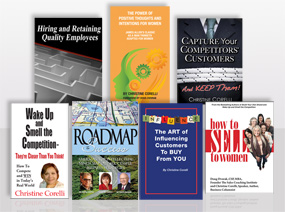
Employee engagement has all the earmarks of a marriage—a business one anyway. It exists when an employee feels that he or she has a job with an employer they support, believe in, and to which they can make a personal contribution.
Regardless of the size of your company or the type of business you’re in, building employee engagement is critical to your organization’s success. A study by the Gallup Organization revealed that companies exhibiting the highest levels of employee engagement are more likely to have above-average productivity (50%), retention (44%), and profitability (33%). Research has also proven that “engaged employees” are more likely to stay with their company, be advocates of its products and services, and contributors to their bottom-line.
As a result of rampant corporate re-structuring, i.e. mergers, acquisitions, consolidation, benefits cuts, hiring freezes, fierce competition and job changes, many businesses are seeing declining levels of employee engagement. In fact, a recent Aon Consulting study of almost 1,800 workers revealed that employee engagement is declining in every industry, age group, income group and job classification.
In another major Gallup survey, they also reported evidence of declining employee engagement, finding that only 26% of employees consider themselves “actively engaged” in their work. As a consequence, Gallup made the following critical recommendations:
- Select individuals based on talent, as opposed to trying to hire a “position”.
- Define outcomes, as opposed to methods or steps, for your staff.
- Focus on employee strengths, as opposed to trying to overcome weaknesses.
- Place the right people in the right job, as opposed to molding a person to fit a job.
Methods to Enhance Employee Engagement…
Establishing a culture of “engaged” people is no easy task, but it is the responsibility of management to make it happen. It involves a great deal more than Gallup’s recommendations. But is the responsibility of management to make it happen. It extends far beyond job satisfaction and directly relates to employee attitudes that contribute to their performance in the workplace. It requires their individual commitment, loyalty, productivity, creativity and ideas. To improve your level of employee engagement, corporations and businesses of all sizes should strive to integrate these simple practices into their culture,
- Keep the lines of communication open. Employees who have access to information, and company knowledge are more apt to feel they are an integral part of the organization. Keep in mind, studies have proven that most people agree important company information should come from upper level management, and not their immediate boss. However, they want to be able to discuss their feelings, opinions, and sensitive issues with their immediate boss.
- If you are in retail business, keep your sales associates informed of how well they are performing and how much they have contributed to overall sales on a month to month basis.
- Re-examine your core business values and involve employees in establishing company values. Make sure you, your management team, and your people live and breathe them every day. In the eyes of your employees, the extent to which you practice your values can be closely linked with their level of employee engagement. They will infer what you value from your behavior. Actively demonstrate your own values, (especially professionalism, respect, dignity, integrity and “duty”) on a continual basis.
- Ask everyone for their extra effort and to show initiative beyond their job description. If rewards are in the picture, you will increase your chances of accomplishing higher levels of employee engagement and involvement.
- It has been said, “An organization is only as good as it’s people.” Create a Total Sales/Service Excellence Culture® where employees recognize that they, too, are “in sales.” Make sure they know that they play a strong role in developing your reputation and building relationships, establishing customer loyalty. Make them accountable for their performance, not only to management and customers, but also to each other. You won’t survive in today’s world, unless you have their commitment to the success of your business.
- Do something about “dead-weight.” Underperformers can hurt productivity and morale. Worse, they can cause high-performers to become disengaged—fast! This holds true for people who cannot keep up with the demands of today’s fast-paced work environment. Work with your people to break down barriers that prevent them from adapting to change.
- Adopt human resource and management practices which create a culture of excellence that both involves and motivates workers. If you own or manage a retail business, develop a true team culture where people function like a professional sports team.
- Address issues that arise dealing with performance management, working relationships and empowerment. Make sure they know empowerment not only means that they are empowered to make decisions, but it also means taking care of their own professional development and career advancement.
- Hard as it may be, make an effort to take twenty minutes a day to talk to people. Don’t stop with “How are you doing?” Ask them about their families, hobbies, interests, and outside activities. Then, “Is there anything I can do to help you? Do you have any questions I can answer?” During these brief visits, let them know their work matters. Herb Kelleher, chairman of Southwest Airlines, recognizes this essential element of employee engagement: “We try to show people that what they do matters. That’s why we share the letters we receive from passengers with all our employees.” A smart practice—that’s how Southwest help their people internalize what they must do to win new customers and obtain customer loyalty.
- Actively encourage your people to share ideas, and even step forward to challenge the Status Quo. Great leaders go beyond this, they demand it. They know that engaging peoples’ brains in finding new, better, more efficient and more profitable ways of doing things builds employee engagement. Respond to employee ideas and suggestions quickly.
- Examine whether your companies internal structures and processes allow your employees to maximize their contributions to the success of your company. If they don’t, change them. Make sure they feel comfortable enough to challenge the “Status Quo.” Keep in mind, within them, lie ideas and solutions to your problems. But if you don’t ask, they won’t speak up.
- Recognize and reward people (both formally and informally) for their individual contributions in the workplace. It is a surefire way to make people feel appreciated and help them feel engaged. Create innovation teams and reward and celebrate innovative ideas that help the company’s productivity and profitability.
- Provide them with the necessary materials, equipment and training to do their job well. Many employees will admit that they have been placed in job positions but have not been properly trained. Consider establishing a “mentor” program. Seek High Performers who are willing to spend a few hours per month help others move forward. Let mentor and mentee set their own ground rules on how they will work together.
- Organizations including Exxon Chemical, AT&T, SBC, Schweppes, GE, and General Tire, have established that front-line supervisors are the opinion leaders in your organization. Because front-line supervisors greatly influence the attitudes and behaviors of others, they are critical to employee engagement. Establish “guiding principles” for managerial excellence and make sure all managers and supervisors adhere to them.
- Are you a retailer? Establish “guiding principles” on how you will treat customers and each other! Make your store a FUN place to come to work each day. Be sure to focus on the two areas that follow. They hold true for business leaders in every industry.
- Follow this essential and simplistic leadership principle: The way to engage employees, is to keep them in the RIGHT FRAME OF MIND-by making them feel they are working WITH you, not FOR you. If they feel they are working FOR you, some of them may behave like robots who go through the motions of their job and never put their hearts and souls into their work, nor show initiative beyond their job role.
- If you truly want to make a difference in your level of employee engagement, you can accomplish this by being a great person to work WITH, and by consistently doing the things which build relationships— expressing appreciation, encouraging, listening, caring, asking for ideas, etc., and by not trying to exercise control. This allows people, of their own free will, to flow in a direction that leads them to cooperate with you and feel valued.
Disengaged Employees—Help Yourselves!
If you are an employee who is finding that you are becoming more and more disengaged, remember that the job you hold with your company is your livelihood. Maintaining a positive attitude and following these simple guidelines may be helpful to you and everyone around you…
- Recognize that executives, managers and business owners make decisions to ensure the future of the enterprise. At times, these decisions make you unhappy, especially when you are personally affected. Contrary to what you might think, executives and business owners are not heartless people. Many have expressed sadness over decisions to make cuts that will directly affect their employees. Keep in mind, it’s not easy to be an executive or entrepreneur—it’s tough. Real tough. Yes, they make the decisions and the big bucks, but they don’t always make the rules. They have a tough Board of Directors and stockholders, (or owners if the company is privately owned) who expect high profits. When they don’t see profits they don’t want to hear the reasons why. They only want results.
- Know what is expected of you. Ask questions and wait for the answers. If it’s not clear to you, don’t hesitate to ask again. You’ll never be sure where you stand if you don’t have direct answers to your concerns.
- Support your sales team. Without them, no one in your company gets a paycheck.
- “To Thine Own Self Be True.” Be willing to put yourself on the line and express yourself. Discuss your ideas and areas of concern with management, but use tact and diplomacy in your approach. Be prepared to offer creative suggestions and solid solutions to problems. The wish of every executive and manager is to have their people come forward not only with problems, but solutions. Grant that wish.
- Focus on your strengths and commit to doing your best. That’s all anyone wants from you.
- Keep your life in balance so you don’t buckle under the pressure to perform. And laugh a little! Business is serious, but find a reason to have a laugh or two each day.
A Final Word to Management…
The vast majority of employees today have little control over their work environments. It’s important that you focus on the areas that drive employee engagement: empowerment, self-development, creativity, achievement, freedom to speak, freedom to contribute, opportunity for life-balance and enjoyable relationships. When you make an effort to do so, your people will feel more fulfilled and will become more “fully engaged.”
For now, ask yourself the question: “Would you work for YOU?”

